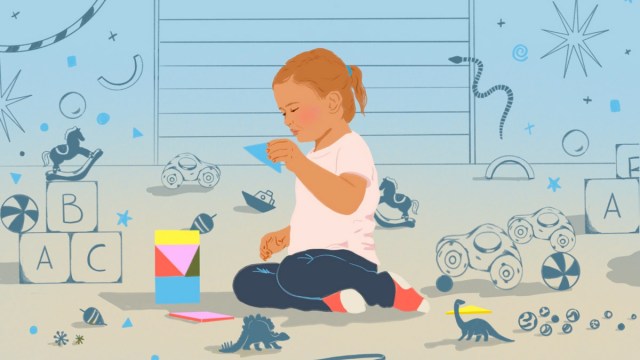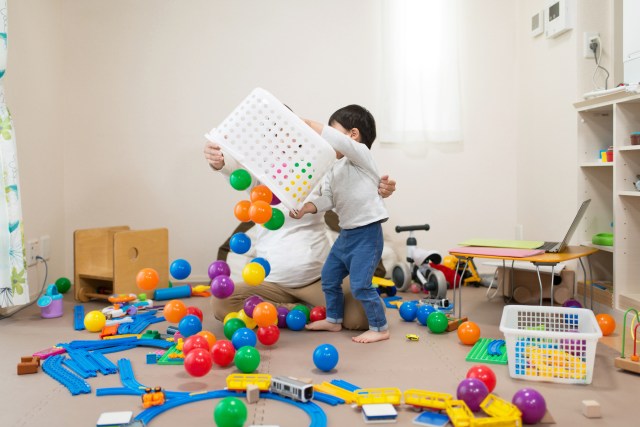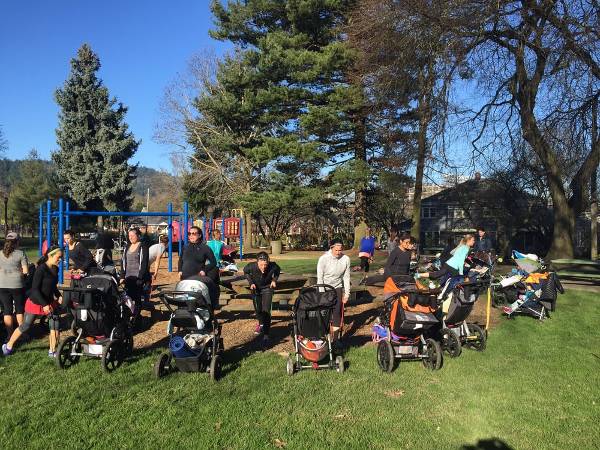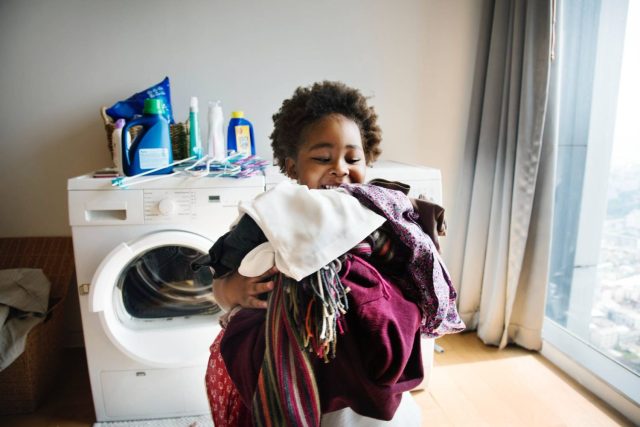It’s hard to imagine how you’re going to juggle all the things when you go back to work after having a baby. On top of your actual job, there’s the laundry and cooking and grocery shopping, the emails from school, the playdates, and your bigger kid’s sweatpants suddenly having holes in every knee. It’s a lot. So we asked 25 working moms to share their best piece of advice, and boy did they deliver—with tips on everything from streamlining your home life to actually, realistically carving out time for yourself.
The Juggle Is Real
Plan the week out in person
“Every Sunday evening, my husband and I sit down and review the week ahead (logistics, upcoming events, to-dos, etc.) and create a one-page document that we print out and leave in an easy-to-see spot. We reference it all week! This exercise helps me get a hold of the ongoing mental list heading into the week.”
Do the small things first
“The best piece of advice I ever got was to live by the one-minute rule. Essentially, you do any task that takes a minute or less immediately. Don’t microwave your coffee, don’t call a friend, don’t pass go and collect $200—just do it now. All those little distractions add up to some aggressively long to-do lists and as working moms, we simply don’t have time for that. So if you bring in the mail, don’t plop it down to deal with later—just go through it right away and throw out the junk. If you get an email from the school that requires an easy response, get it over with. By getting all these little things out of the way ASAP you’re making more time for the big stuff, and we all need more time for the big stuff.”
Go ahead, take the shortcut
“Working full-time with young kids is hard, no doubt about it. Do what you have to do to get through the day, because some days are harder than others. Grilled cheese (for the fourth time this week)? Why not! A little extra screen time so you can complete a task that can no longer wait? Go for it. Sometimes, it’s about survival. These don’t have to be the moments that define you as a mom. These are the moments that let you keep the ship afloat so you can be the mom you really want to be.”
Prep the night before
“Whether you need to leave the house to go to work daily or once a week, make that morning as streamlined as possible. Shower the night before if you can. Plan your outfit and the kids’ clothes. Pack lunches. The easier it is for you to get ready, the easier it is to get out the door, and the smoother your day will be.”
Take allll the help
“My advice is to take any help you can get. Don’t try to be a hero. It literally takes a village. Know who you can count on for carpools and when you can share responsibilities with people you trust.”
Divide and conquer (and reevaluate regularly)
“I was the primary parent for many years, and even though I am now working full-time, I’m the primary parent in many ways. There are times when this becomes too much and the anger can build. Why do I need to still take care of the stuff I did before? The answer is, I don’t. This may mean our house is messier for longer, or the kids don’t get as many playdates, but inevitably, we started new routines and new schedules to balance out the division of labor. And if it feels like it’s not working again, it’s back to the drawing board to figure out a new routine. Don’t expect to have it all figured out right away. You need to try things out for a bit, sit with it, and adjust as needed.”
Switch up nighttime routines
“When it comes to the daily routine, try not to have one parent do bath time and bedtime every night. We have always had one parent clean up after dinner and the other handle the bedtime routine. And then the next night we switch, although it can be hard if mom is nursing. My husband would do everything to get the baby ready for bed, and I would nurse as the final step. Then your baby gets used to both parents, not only mom, at bedtime.”
Take the Zumba class
“A co-worker of mine once told me when my kids were really young how important it is for moms to have a life outside of their kids. At the time I would rush from work to pick them up from daycare when what I really wanted to do was attend the Zumba class that was held at our office. She encouraged me to do that and it really was life-changing. Now, I regularly leave them to travel and they have developed so many great life skills from me not always being home. Plus they see me following my dreams even as an adult which I think is so important.”
Work Life
Never apologize
“Do not apologize for saying ‘I need to go pick up my kids.’ Anything having to do with caring for your kids does not need an apology. To anyone. Ever. Be gracious and polite and tactful as the situation calls for, but don’t tell anyone you’re sorry you need to be a parent.”
Talk about your littles
“When I first had my daughter, I was reluctant to talk about parenting with clients and colleagues. I didn’t want anyone to assume that motherhood would get in the way of my performance. But I’ve come to realize that commiserating about potty training is actually a great way to break the ice and forge relationships with the parents I work with. These days, if I know a client or colleague has kids, I make a point of asking about them. This approach might not be right for every workplace, but it’s been effective for me.”
Seek out mother mentors
“Create a village at work to support you. Find mentors to help guide you as you make potentially new career decisions as a working mother. It’s great to engage women for your personal board of directors who are a few steps ahead of you in the working motherhood journey. That way they can share what they did in your shoes as you find new opportunities.”
Know your rights
“Know your rights as a mother and what the law says about maternity leave, time off to care for sick kids, time off for doctor visits, pumping and privacy, etc. No one can take advantage of you when you can back things up with the law.”
Dual Identities
Set work and socialization boundaries
“It can become awkward if your office environment is a more social one and you have to/want to/need to go home to your family. If you do feel tension around this, speak to your manager. Explain your boundaries – it’s better to be upfront and have everyone understand the expectations. Just be aware that you’ll have to stay and play sometimes (and that’s OK!).”
Work-life balance takes work
“Work-life balance isn’t a 50/50 daily split. It’s intentionally making the time for the things that you really care about, using boundaries, prioritizing, and planning your time over the long term. If you don’t have boundaries, everything is harder when it comes to finding time for what you care about. The easiest way to maintain boundaries after you define them is to use your calendar. Block off time to indicate when your work day ends. Put time on your calendar when you know you’ll be focused on family. Carve out time for things like exercise and self-care.”
Take time to switch from mom mode to work mode
“I usually feel a little frazzled from the adrenaline of the morning rush, so I give myself 25 minutes to shake it off and prepare myself to start my work day. I pop on a chatty, fun podcast (or put on some feel-good music if that’s more my mood), and do a quick sweep of the spaces I need to use. I remove all of the obvious kid debris and mess so that the space feels more calm and ordered. Then I change into an outfit I feel good in and do a two-minute glow-up to hide the tired eyes. I take a moment to make a coffee or eat something nourishing in my garden; just five minutes or so to myself outside in nature to reset. Then I head to my desk and get started–work mode activated!”
Focus on one thing at a time
“Avoid multitasking when it comes to childminding and working at the same time—it’s a poor result for everyone if you’re attempting to work while spending time with your children and vice-versa.”
Advancing In Your Career
Work advancements may mean less
“Once I had kids, I knew that work no longer took priority for me. And even though I went back to work eventually, I no longer felt like I needed the ‘cool’ job or the better title. I liked being able to work again, but also being able to shut my computer off and be with my family. I am a full-time project manager at home, I don’t need to be one at my job.”
Make deals on the playground
“You know the old cliché that business deals are made on the golf course? Well, they can be made on the playground too! I’ve found that parents, and moms in particular, are willing to help fellow parents reach career goals. Leveraging my network of fellow moms has led to valuable business relationships and even new clients.”
Work smarter and put yourself first
“Before kids I considered myself a hard worker, staying late at the office, taking on tasks for which I wasn’t recognized, agonizing over every word in an email. I no longer have that time as a working mom. Now I say no to tasks that don’t serve me, walk away from time-sucking clients, and yes, send a few emails with typos. I’ve dialed down my efforts at work and I’ve found that the work I produce is just as good.”
Put pumping on the cal
“If you’re planning to pump, put that time on your calendar so it doesn’t get eaten up by other meetings or requests. People will know that you’re unavailable.”
Mom Guilt and Expectations
No one has all the answers
“Don’t let anyone, especially social media influencers or experts, tell you what you can or can’t do. Don’t get hooked into the narrative of the burnt-out mom if it doesn’t serve you. We’ll all get overwhelmed, but it’s not written in the sky that you can’t have what you want in all aspects of your life. We’re just told, a lot, that, no, we can’t. And I don’t buy it.”
A little sorry goes a long way
“There may be moments when you lose your cool with your kid. Trying to get out the door in the morning when you’re already late for work is an opportune time for this. When you cool off later that day or even later that week, apologize and admit you made a mistake. Everyone will feel better for it.”
So does a little one-on-one time
“Try to carve out a little time each day to focus on your kids. Even just 10 minutes of ‘golden time’ as they call it. Makes me feel less guilty for the time I don’t get to spend with them and sometimes it actually helps their behavior.”
Making Time For Yourself (Really Though)
Rise and shine
“I like to get up as early as I can muster to have some alone time before the rest of my family wakes up. I make coffee, read a few chapters of my book, and just generally let myself bask in the quiet. I find that when my kids do get up I’m more calm and prepared for whatever they throw my way (tantrums, fights, breakfast disasters). Some people call it the 5 a.m. club, but mine’s more 6 a.m. or later because I’m not a morning person at all. But I do go to bed as early as I can to make this work.”
Fresh air is your friend
“I like to go for a walk before work, even when I work from home, and I call it my commute. Alone time, fresh air, and steps make me feel more ready for the day.”



































